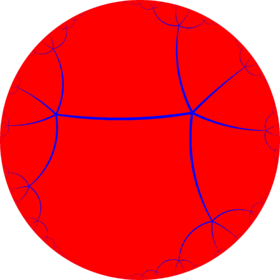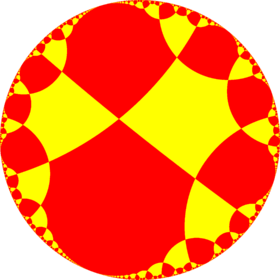Order-5 hexagonal tiling honeycomb
In the field of hyperbolic geometry, the order-5 hexagonal tiling honeycomb arises as one of 11 regular paracompact honeycombs in 3-dimensional hyperbolic space. It is paracompact because it has cells composed of an infinite number of faces. Each cell consists of a hexagonal tiling whose vertices lie on a horosphere, a flat plane in hyperbolic space that approaches a single ideal point at infinity.
| Order-5 hexagonal tiling honeycomb | |
|---|---|
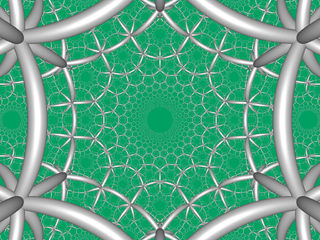 Perspective projection view from center of Poincaré disk model | |
| Type | Hyperbolic regular honeycomb Paracompact uniform honeycomb |
| Schläfli symbol | {6,3,5} |
| Coxeter-Dynkin diagrams |  |
| Cells | {6,3} |
| Faces | hexagon {6} |
| Edge figure | pentagon {5} |
| Vertex figure | icosahedron |
| Dual | Order-6 dodecahedral honeycomb |
| Coxeter group | , [5,3,6] |
| Properties | Regular |
The Schläfli symbol of the order-5 hexagonal tiling honeycomb is {6,3,5}. Since that of the hexagonal tiling is {6,3}, this honeycomb has five such hexagonal tilings meeting at each edge. Since the Schläfli symbol of the icosahedron is {3,5}, the vertex figure of this honeycomb is an icosahedron. Thus, 20 hexagonal tilings meet at each vertex of this honeycomb.[1]
A geometric honeycomb is a space-filling of polyhedral or higher-dimensional cells, so that there are no gaps. It is an example of the more general mathematical tiling or tessellation in any number of dimensions.
Honeycombs are usually constructed in ordinary Euclidean ("flat") space, like the convex uniform honeycombs. They may also be constructed in non-Euclidean spaces, such as hyperbolic uniform honeycombs. Any finite uniform polytope can be projected to its circumsphere to form a uniform honeycomb in spherical space.
Symmetry
A lower-symmetry construction of index 120, [6,(3,5)*], exists with regular dodecahedral fundamental domains, and an icosahedral Coxeter-Dynkin diagram with 6 axial infinite-order (ultraparallel) branches.
Images
The order-5 hexagonal tiling honeycomb is similar to the 2D hyperbolic regular paracompact order-5 apeirogonal tiling, {∞,5}, with five apeirogonal faces meeting around every vertex.
Related polytopes and honeycombs
The order-5 hexagonal tiling honeycomb is a regular hyperbolic honeycomb in 3-space, and one of 11 which are paracompact.
| 11 paracompact regular honeycombs | |||||||||||
|---|---|---|---|---|---|---|---|---|---|---|---|
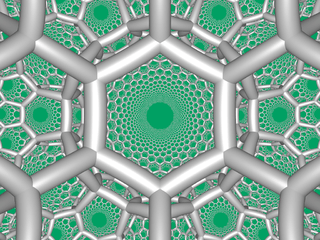 {6,3,3} |
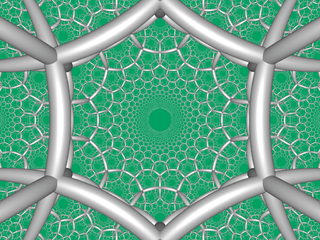 {6,3,4} |
 {6,3,5} |
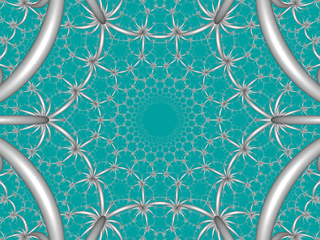 {6,3,6} |
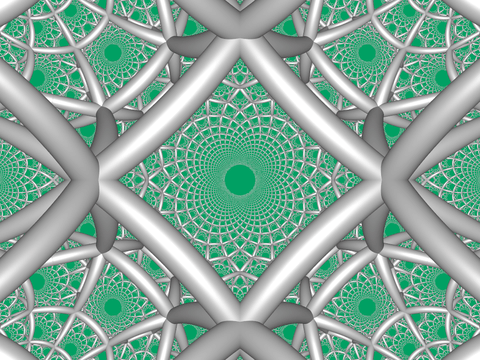 {4,4,3} |
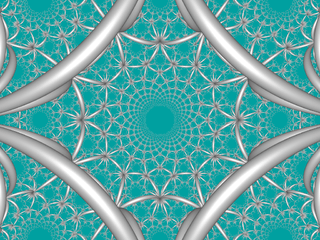 {4,4,4} | ||||||
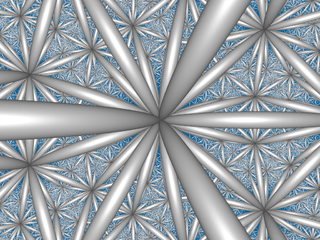 {3,3,6} |
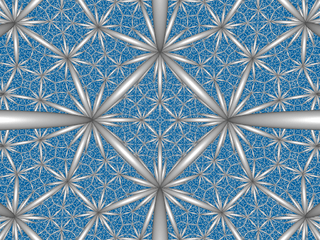 {4,3,6} |
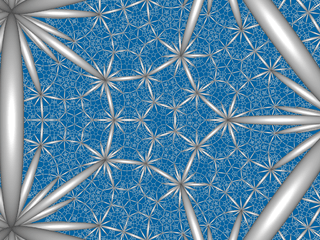 {5,3,6} |
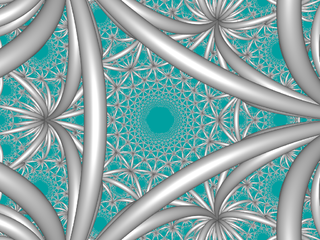 {3,6,3} |
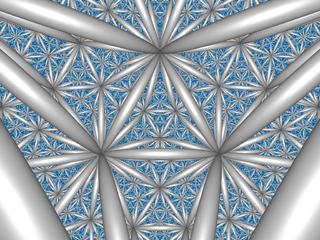 {3,4,4} | |||||||
There are 15 uniform honeycombs in the [6,3,5] Coxeter group family, including this regular form, and its regular dual, the order-6 dodecahedral honeycomb.
| {6,3,5} | r{6,3,5} | t{6,3,5} | rr{6,3,5} | t0,3{6,3,5} | tr{6,3,5} | t0,1,3{6,3,5} | t0,1,2,3{6,3,5} |
|---|---|---|---|---|---|---|---|
 |
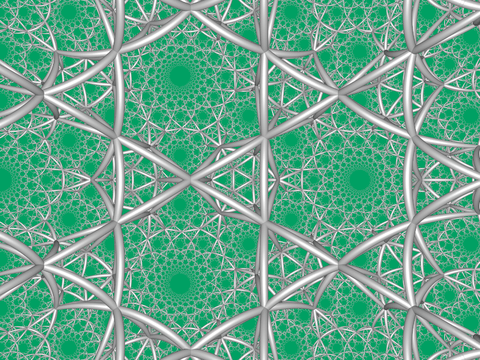 |
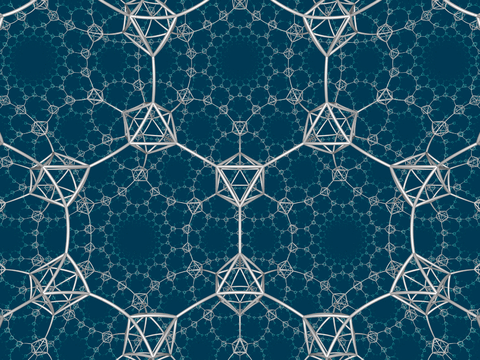 |
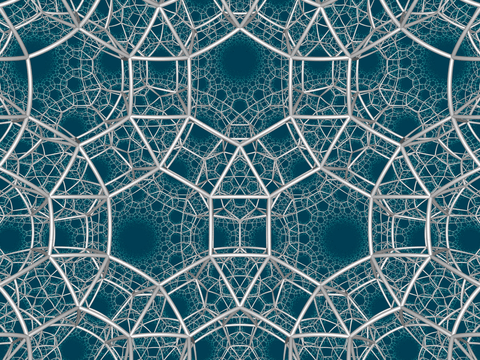 |
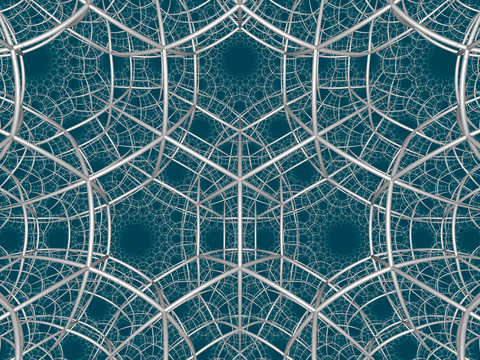 |
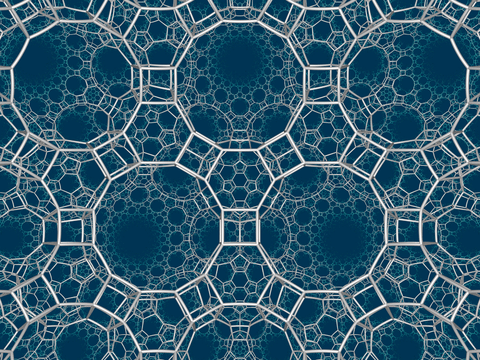 |
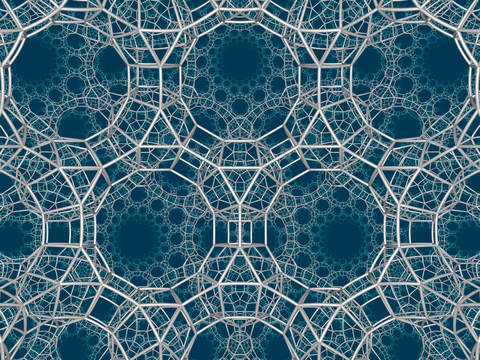 |
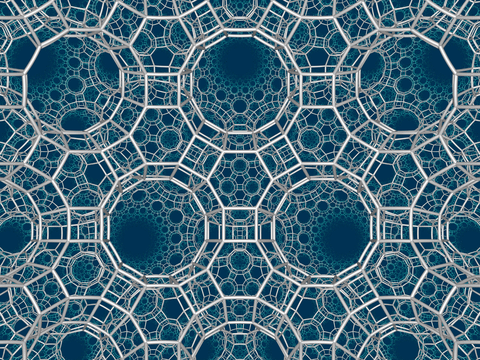 |
 |
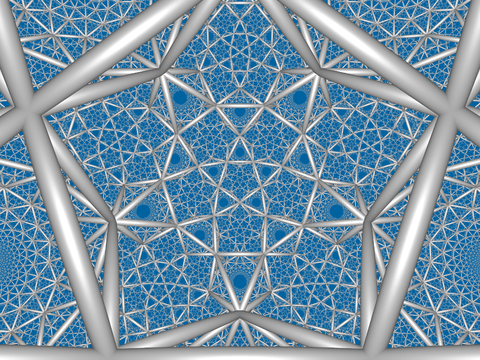 |
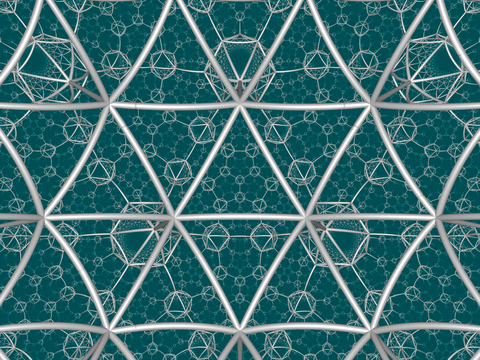 |
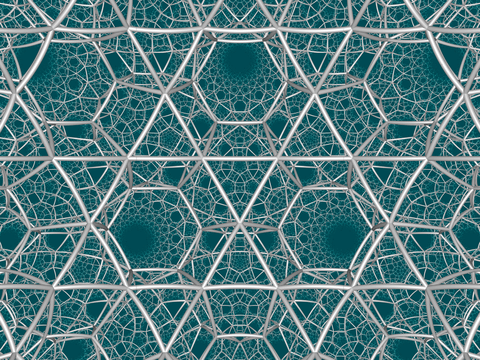 |
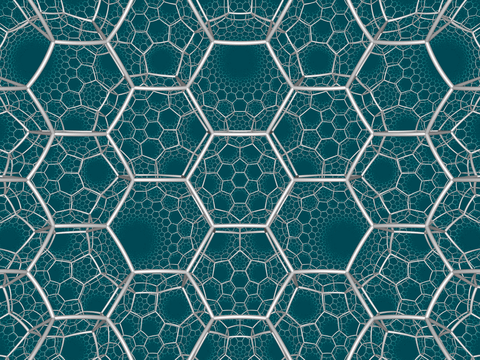 |
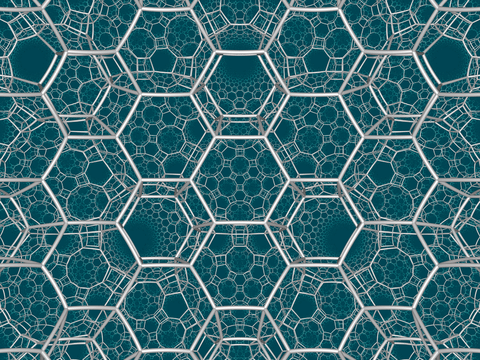 |
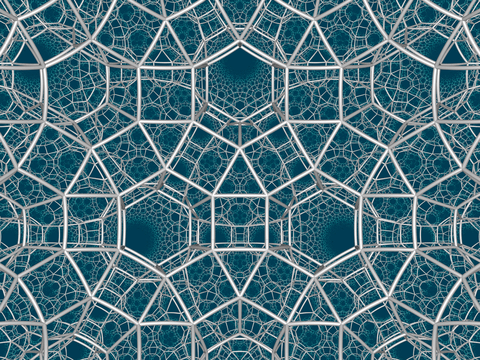 | |
| {5,3,6} | r{5,3,6} | t{5,3,6} | rr{5,3,6} | 2t{5,3,6} | tr{5,3,6} | t0,1,3{5,3,6} | t0,1,2,3{5,3,6} |
The order-5 hexagonal tiling honeycomb has a related alternation honeycomb, represented by ![]()
![]()
![]()
![]()
![]()
![]()
![]()
![]()
![]()
![]()
![]()
![]()
It is a part of sequence of regular hyperbolic honeycombs of the form {6,3,p}, with hexagonal tiling facets:
| {6,3,p} honeycombs | |||||||||||
|---|---|---|---|---|---|---|---|---|---|---|---|
| Space | H3 | ||||||||||
| Form | Paracompact | Noncompact | |||||||||
| Name | {6,3,3} | {6,3,4} | {6,3,5} | {6,3,6} | {6,3,7} | {6,3,8} | ... {6,3,∞} | ||||
| Coxeter |
|||||||||||
| Image |  |
 |
 |
 |
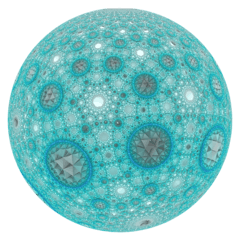 |
 |
 | ||||
| Vertex figure {3,p} |
{3,3} |
{3,4} |
{3,5} |
{3,6} |
{3,7} |
{3,8} |
{3,∞} | ||||
It is also part of a sequence of regular polychora and honeycombs with icosahedral vertex figures:
| {p,3,5} polytopes | |||||||
|---|---|---|---|---|---|---|---|
| Space | S3 | H3 | |||||
| Form | Finite | Compact | Paracompact | Noncompact | |||
| Name | {3,3,5} |
{4,3,5} |
{5,3,5} |
{6,3,5} |
{7,3,5} |
{8,3,5} |
... {∞,3,5} |
| Image | 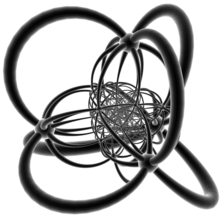 |
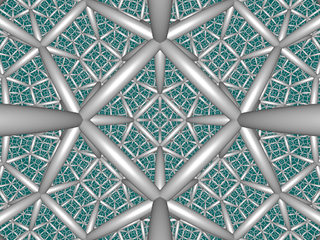 |
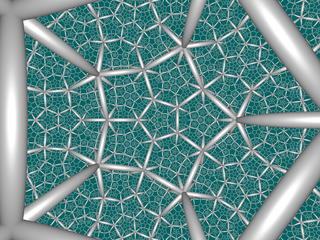 |
 |
 |
 |
 |
| Cells | {3,3} |
{4,3} |
{5,3} |
{6,3} |
{7,3} |
{8,3} |
{∞,3} |
Rectified order-5 hexagonal tiling honeycomb
| Rectified order-5 hexagonal tiling honeycomb | |
|---|---|
| Type | Paracompact uniform honeycomb |
| Schläfli symbols | r{6,3,5} or t1{6,3,5} |
| Coxeter diagrams | |
| Cells | {3,5} r{6,3} or h2{6,3} |
| Faces | triangle {3} hexagon {6} |
| Vertex figure |  pentagonal prism |
| Coxeter groups | , [5,3,6] , [5,3[3]] |
| Properties | Vertex-transitive, edge-transitive |
The rectified order-5 hexagonal tiling honeycomb, t1{6,3,5}, ![]()
![]()
![]()
![]()
![]()
![]()
![]()

It is similar to the 2D hyperbolic infinite-order square tiling, r{∞,5} with pentagon and apeirogonal faces. All vertices are on the ideal surface.
| Space | S3 | H3 | ||||
|---|---|---|---|---|---|---|
| Form | Finite | Compact | Paracompact | Noncompact | ||
| Name | r{3,3,5} |
r{4,3,5} |
r{5,3,5} |
r{6,3,5} |
r{7,3,5} |
... r{∞,3,5} |
| Image | 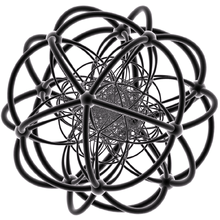 |
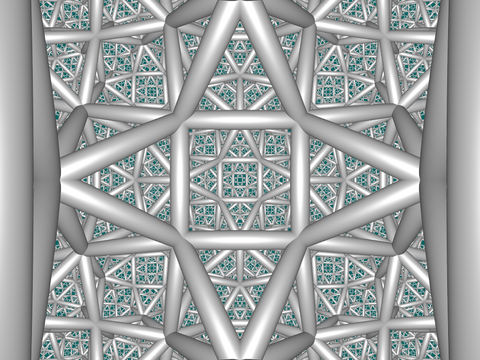 |
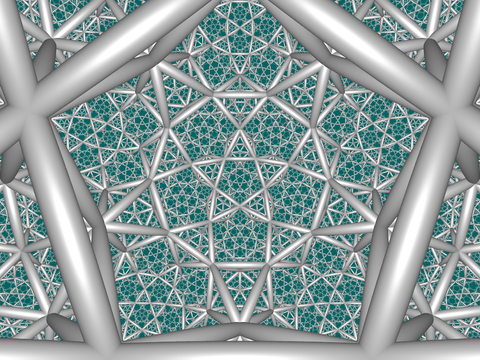 |
 |
||
| Cells {3,5} |
r{3,3} |
r{4,3} |
r{5,3} |
r{6,3} |
r{7,3} |
r{∞,3} |
Truncated order-5 hexagonal tiling honeycomb
| Truncated order-5 hexagonal tiling honeycomb | |
|---|---|
| Type | Paracompact uniform honeycomb |
| Schläfli symbol | t{6,3,5} or t0,1{6,3,5} |
| Coxeter diagram | |
| Cells | {3,5} t{6,3} |
| Faces | triangle {3} dodecagon {12} |
| Vertex figure |  pentagonal pyramid |
| Coxeter groups | , [5,3,6] |
| Properties | Vertex-transitive |
The truncated order-5 hexagonal tiling honeycomb, t0,1{6,3,5}, ![]()
![]()
![]()
![]()
![]()
![]()
![]()

Bitruncated order-5 hexagonal tiling honeycomb
| Bitruncated order-5 hexagonal tiling honeycomb | |
|---|---|
| Type | Paracompact uniform honeycomb |
| Schläfli symbol | 2t{6,3,5} or t1,2{6,3,5} |
| Coxeter diagram | |
| Cells | t{3,6} t{3,5} |
| Faces | pentagon {5} hexagon {6} |
| Vertex figure |  digonal disphenoid |
| Coxeter groups | , [5,3,6] , [5,3[3]] |
| Properties | Vertex-transitive |
The bitruncated order-5 hexagonal tiling honeycomb, t1,2{6,3,5}, ![]()
![]()
![]()
![]()
![]()
![]()
![]()

Cantellated order-5 hexagonal tiling honeycomb
| Cantellated order-5 hexagonal tiling honeycomb | |
|---|---|
| Type | Paracompact uniform honeycomb |
| Schläfli symbol | rr{6,3,5} or t0,2{6,3,5} |
| Coxeter diagram | |
| Cells | r{3,5} rr{6,3} {}x{5} |
| Faces | triangle {3} square {4} pentagon {5} hexagon {6} |
| Vertex figure |  wedge |
| Coxeter groups | , [5,3,6] |
| Properties | Vertex-transitive |
The cantellated order-5 hexagonal tiling honeycomb, t0,2{6,3,5}, ![]()
![]()
![]()
![]()
![]()
![]()
![]()

Cantitruncated order-5 hexagonal tiling honeycomb
| Cantitruncated order-5 hexagonal tiling honeycomb | |
|---|---|
| Type | Paracompact uniform honeycomb |
| Schläfli symbol | tr{6,3,5} or t0,1,2{6,3,5} |
| Coxeter diagram | |
| Cells | t{3,5} tr{6,3} {}x{5} |
| Faces | square {4} pentagon {5} hexagon {6} dodecagon {12} |
| Vertex figure |  mirrored sphenoid |
| Coxeter groups | , [5,3,6] |
| Properties | Vertex-transitive |
The cantitruncated order-5 hexagonal tiling honeycomb, t0,1,2{6,3,5}, ![]()
![]()
![]()
![]()
![]()
![]()
![]()

Runcinated order-5 hexagonal tiling honeycomb
| Runcinated order-5 hexagonal tiling honeycomb | |
|---|---|
| Type | Paracompact uniform honeycomb |
| Schläfli symbol | t0,3{6,3,5} |
| Coxeter diagram | |
| Cells | {6,3} {5,3} {}x{6} {}x{5} |
| Faces | square {4} pentagon {5} hexagon {6} |
| Vertex figure |  irregular triangular antiprism |
| Coxeter groups | , [5,3,6] |
| Properties | Vertex-transitive |
The runcinated order-5 hexagonal tiling honeycomb, t0,3{6,3,5}, ![]()
![]()
![]()
![]()
![]()
![]()
![]()

Runcitruncated order-5 hexagonal tiling honeycomb
| Runcitruncated order-5 hexagonal tiling honeycomb | |
|---|---|
| Type | Paracompact uniform honeycomb |
| Schläfli symbol | t0,1,3{6,3,5} |
| Coxeter diagram | |
| Cells | t{6,3} rr{5,3} {}x{5} {}x{12} |
| Faces | triangle {3} square {4} pentagon {5} dodecagon {12} |
| Vertex figure | isosceles-trapezoidal pyramid |
| Coxeter groups | , [5,3,6] |
| Properties | Vertex-transitive |
The runcitruncated order-5 hexagonal tiling honeycomb, t0,1,3{6,3,5}, ![]()
![]()
![]()
![]()
![]()
![]()
![]()

Runcicantellated order-5 hexagonal tiling honeycomb
The runcicantellated order-5 hexagonal tiling honeycomb is the same as the runcitruncated order-6 dodecahedral honeycomb.
Omnitruncated order-5 hexagonal tiling honeycomb
| Omnitruncated order-5 hexagonal tiling honeycomb | |
|---|---|
| Type | Paracompact uniform honeycomb |
| Schläfli symbol | t0,1,2,3{6,3,5} |
| Coxeter diagram | |
| Cells | tr{6,3} tr{5,3} {}x{10} {}x{12} |
| Faces | square {4} hexagon {6} decagon {10} dodecagon {12} |
| Vertex figure |  irregular tetrahedron |
| Coxeter groups | , [5,3,6] |
| Properties | Vertex-transitive |
The omnitruncated order-5 hexagonal tiling honeycomb, t0,1,2,3{6,3,5}, ![]()
![]()
![]()
![]()
![]()
![]()
![]()

Alternated order-5 hexagonal tiling honeycomb
| Alternated order-5 hexagonal tiling honeycomb | |
|---|---|
| Type | Paracompact uniform honeycomb Semiregular honeycomb |
| Schläfli symbol | h{6,3,5} |
| Coxeter diagram | |
| Cells | {3[3]} {3,5} |
| Faces | triangle {3} |
| Vertex figure | truncated icosahedron |
| Coxeter groups | , [5,3[3]] |
| Properties | Vertex-transitive, edge-transitive, quasiregular |
The alternated order-5 hexagonal tiling honeycomb, h{6,3,5}, ![]()
![]()
![]()
![]()
![]()
![]()
![]()
![]()
![]()
![]()
![]()
![]()
Cantic order-5 hexagonal tiling honeycomb
| Cantic order-5 hexagonal tiling honeycomb | |
|---|---|
| Type | Paracompact uniform honeycomb |
| Schläfli symbol | h2{6,3,5} |
| Coxeter diagram | |
| Cells | h2{6,3} t{3,5} r{5,3} |
| Faces | triangle {3} pentagon {5} hexagon {6} |
| Vertex figure |  triangular prism |
| Coxeter groups | , [5,3[3]] |
| Properties | Vertex-transitive |
The cantic order-5 hexagonal tiling honeycomb, h2{6,3,5}, ![]()
![]()
![]()
![]()
![]()
![]()
![]()
![]()
![]()
![]()
![]()
![]()
Runcic order-5 hexagonal tiling honeycomb
| Runcic order-5 hexagonal tiling honeycomb | |
|---|---|
| Type | Paracompact uniform honeycomb |
| Schläfli symbol | h3{6,3,5} |
| Coxeter diagram | |
| Cells | {3[3]} rr{5,3} {5,3} {}x{3} |
| Faces | triangle {3} square {4} pentagon {5} |
| Vertex figure |  triangular cupola |
| Coxeter groups | , [5,3[3]] |
| Properties | Vertex-transitive |
The runcic order-5 hexagonal tiling honeycomb, h3{6,3,5}, ![]()
![]()
![]()
![]()
![]()
![]()
![]()
![]()
![]()
![]()
![]()
![]()
Runcicantic order-5 hexagonal tiling honeycomb
| Runcicantic order-5 hexagonal tiling honeycomb | |
|---|---|
| Type | Paracompact uniform honeycomb |
| Schläfli symbol | h2,3{6,3,5} |
| Coxeter diagram | |
| Cells | h2{6,3} tr{5,3} t{5,3} {}x{3} |
| Faces | triangle {3} square {4} hexagon {6} decagon {10} |
| Vertex figure |  rectangular pyramid |
| Coxeter groups | , [5,3[3]] |
| Properties | Vertex-transitive |
The runcicantic order-5 hexagonal tiling honeycomb, h2,3{6,3,5}, ![]()
![]()
![]()
![]()
![]()
![]()
![]()
![]()
![]()
![]()
![]()
![]()
See also
- Convex uniform honeycombs in hyperbolic space
- Regular tessellations of hyperbolic 3-space
- Paracompact uniform honeycombs
References
- Coxeter The Beauty of Geometry, 1999, Chapter 10, Table III
- Coxeter, Regular Polytopes, 3rd. ed., Dover Publications, 1973. ISBN 0-486-61480-8. (Tables I and II: Regular polytopes and honeycombs, pp. 294–296)
- The Beauty of Geometry: Twelve Essays (1999), Dover Publications, LCCN 99-35678, ISBN 0-486-40919-8 (Chapter 10, Regular Honeycombs in Hyperbolic Space) Table III
- Jeffrey R. Weeks The Shape of Space, 2nd edition ISBN 0-8247-0709-5 (Chapter 16-17: Geometries on Three-manifolds I,II)
- Norman Johnson Uniform Polytopes, Manuscript
- N.W. Johnson: The Theory of Uniform Polytopes and Honeycombs, Ph.D. Dissertation, University of Toronto, 1966
- N.W. Johnson: Geometries and Transformations, (2018) Chapter 13: Hyperbolic Coxeter groups
